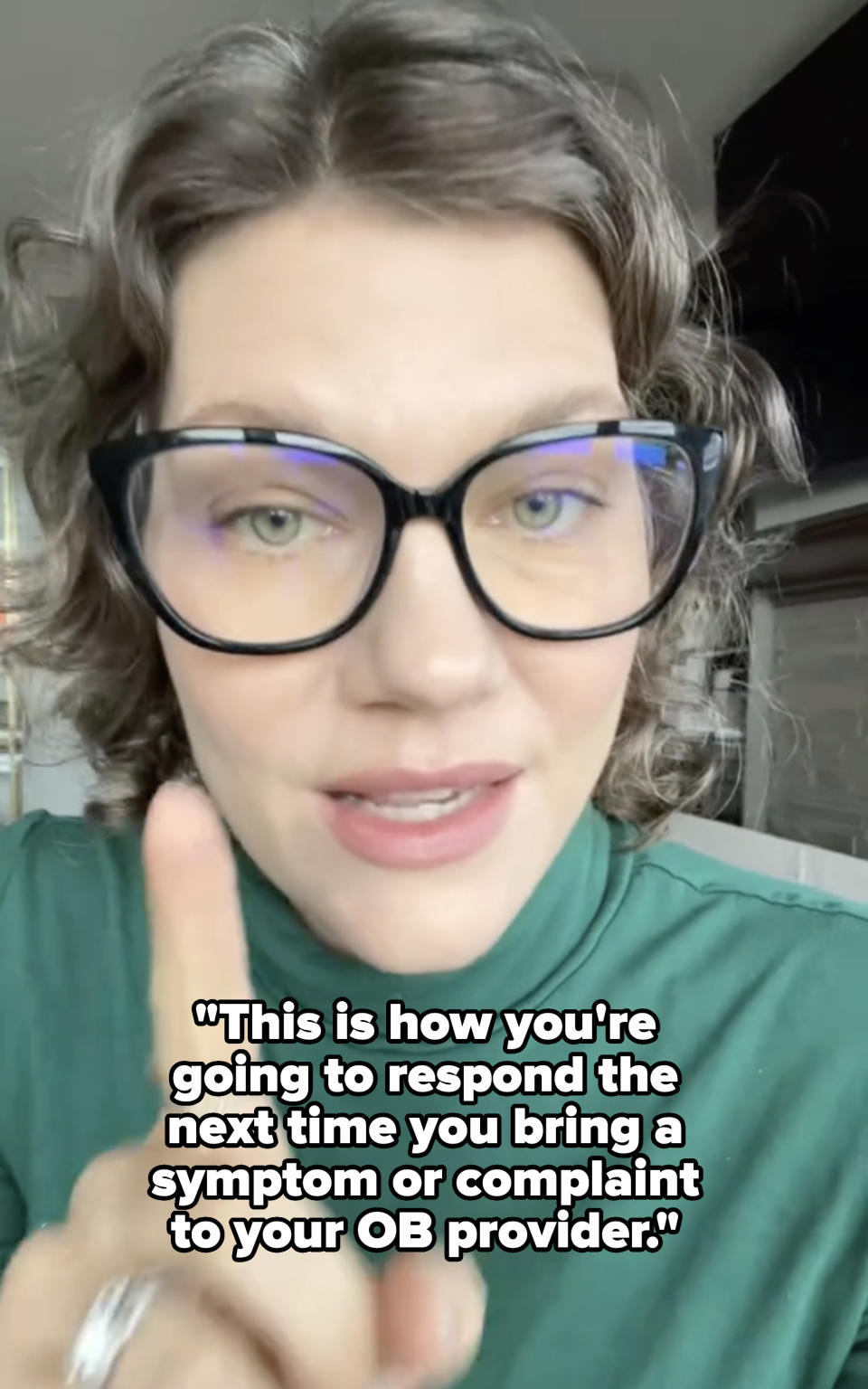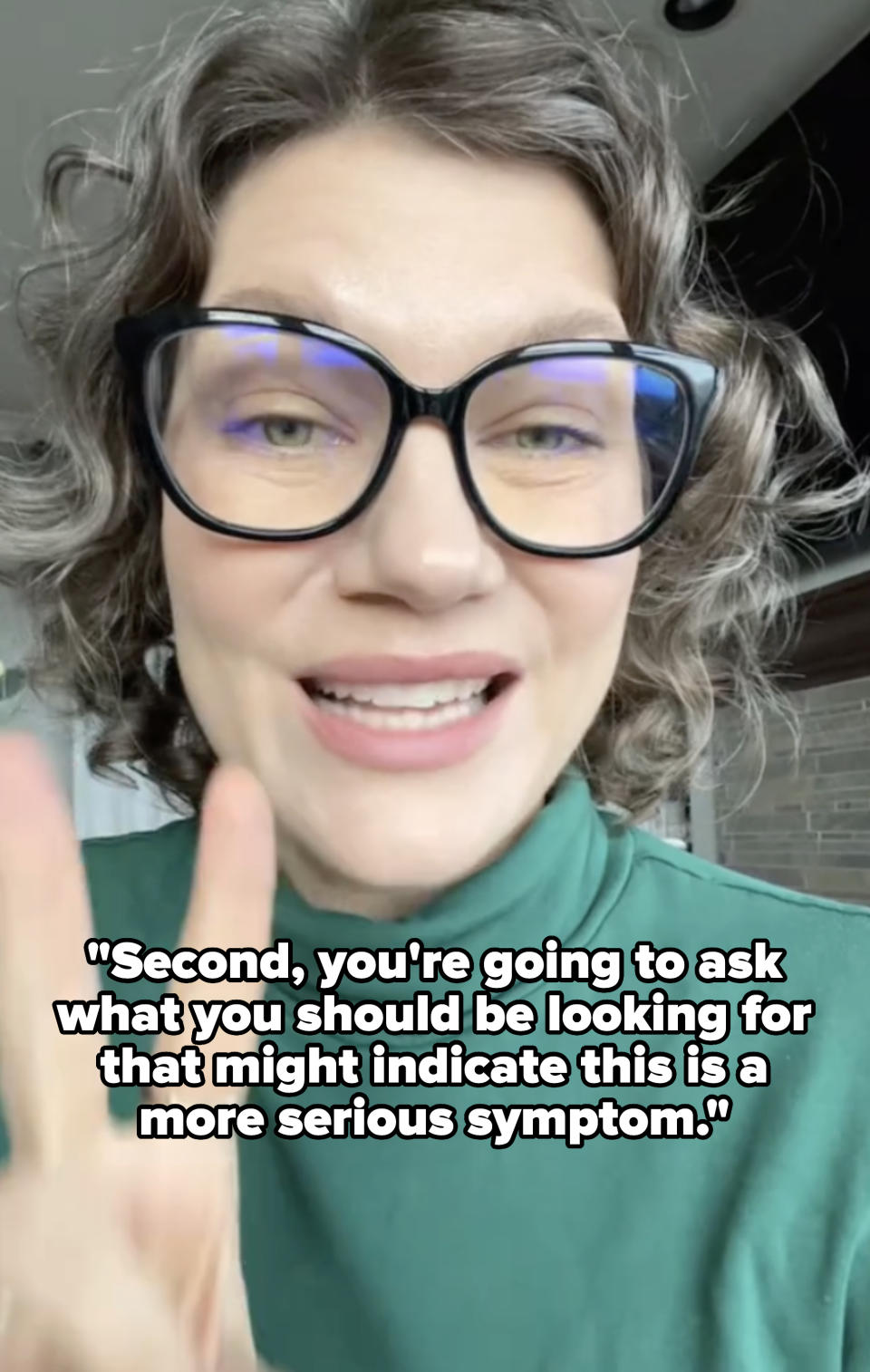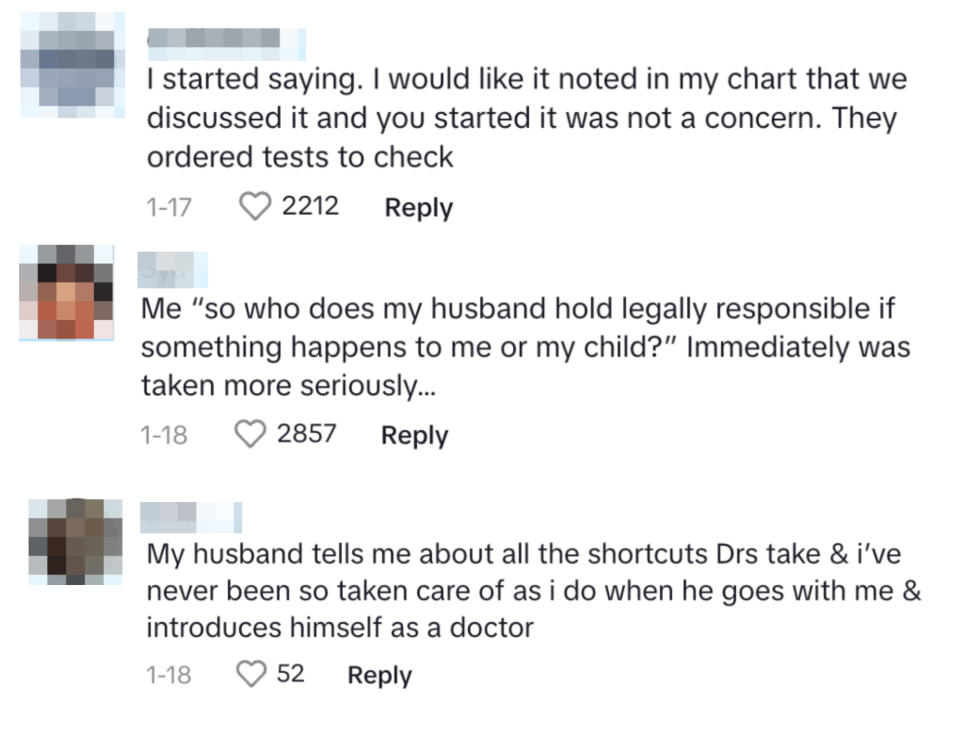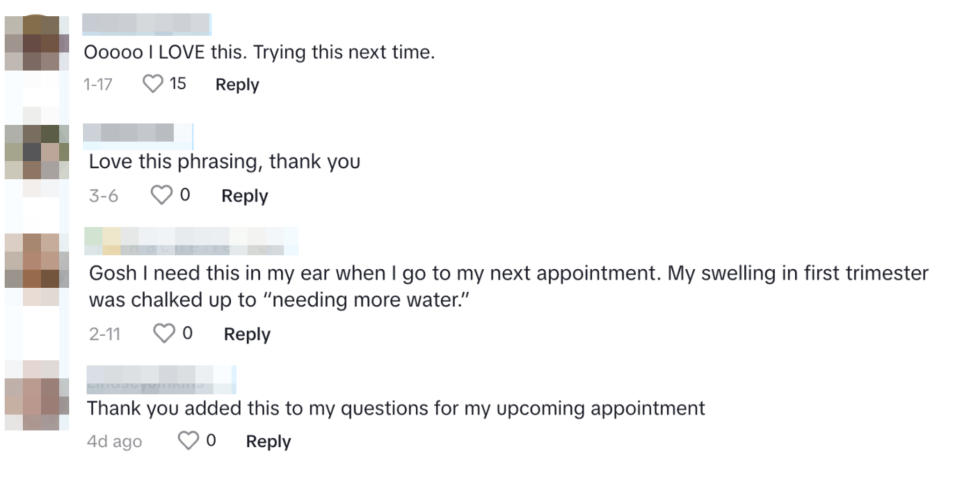"This Dismissal 100% Contributes To Maternal Mortality": An OB-GYN Went Viral For Sharing How To Respond When Your Doctor Dismisses Your Concerns, And We All Need To Hear This
I tend to use the term "gaslighting" lightly because it's so overused, but that is often not the case when it comes to reproductive healthcare. Too often are patients dismissed, and even gaslighted, about their symptoms, especially during pregnancy.

As one creator put it in a viral video that's now been viewed over 1.2 million times, "Being pregnant is going to your doctor and saying anything, and them going, 'Yep, that's normal.'" Many others agreed, with, uh, several concerning responses:

Fortunately, Noa Sterling, MD, FACOG, stepped in and stitched the video with a bit of advice. She laid out exactly what you should do when you have a concern that your OB-GYN or another doctor dismisses as normal.
@drsterlingobgyn / Via tiktok.com
Sterling is an OB-GYN, so her advice is specific to reproductive health, pregnancy, and postpartum care, but I find her advice can also be applied to other healthcare providers too.
She began, "This is how you're going to respond the next time you bring a symptom or complaint to your OB provider and you're just told, 'That's normal.'"

She added, "By the way, I'm not joking. This dismissal of people's concerns and complaints 100% contributes to maternal mortality."

Sterling noted that she thinks this is probably one of the reasons that Black maternal mortality is so much higher than among white women — because Black women are oftentimes not listened to in medical settings.
A Pew Research Center survey found that 34% of Black women do not feel their "women's health concerns or symptoms" are taken seriously in interactions with doctors and other healthcare providers, and 63% said they had at least one prior negative healthcare experience that was measured in the survey.
"Anyway, let's get back to what you're going to do when you have a concern that's dismissed as normal," Sterling continued. "This is what you say: 'I know that normal pregnancy symptoms can sometimes be an indication that something more serious is going on. What about my situation tells you this is not something serious and not something that I need to be concerned about?'"

"Second, you're going to ask what you should be looking for that might indicate this is a more serious symptom."

"Now, the third thing is optional. If you would like your provider to do something about this symptom, you can say, 'I am glad that you think this isn't something serious, however, I would like to do something about this symptom. What do you suggest?'"

In the comments, many people shared the heartbreaking, concerning, and scary consequences of being dismissed by a doctor that they experienced.

Others shared their own experiences successfully getting doctors to take them more seriously — some of which of course included getting a man involved (🙃).

And many were thankful to hear Sterling's advice.

Sterling told BuzzFeed that when you speak up and tell your provider you aren't feeling heard, that should result in a change. She said that if it doesn't, it might be a red flag. "If you've expressed that you are feeling dismissed and they continue in the same manner, it might be time to find a provider who is a better fit for you," she said.

In the case of pregnancy, Sterling stated that practically every "normal" symptom could imply that something more serious is occurring, which is why many symptoms are dismissed as normal without further investigation. She emphasized how crucial it is for your provider to follow up with questions and concerns about your symptoms.

Sterling said, "For example, shortness of breath can just be a regular pregnancy symptom, or it could be a blood clot in your lungs, which can be life-threatening. When you tell your OB provider you are feeling short of breath, they should follow up with more questions before saying it's 'normal.'"
If your doctor does say your symptom is normal without asking more questions, Sterling reiterated that you'll want to ask what you should know and look out for in the event the symptom is more serious. She said, "Say something to the effect of, 'I know shortness of breath can also be a sign of something serious. What should I be on the lookout for?'"
If you're struggling to make the most out of your often hasty and quickly cut-short visits with your provider, Sterling suggested making a list of your concerns and questions and bringing it with you to your appointment.

She said, "This list should be prioritized so that you address your most pressing concern first. Tell your provider at the beginning of the visit that you have the list. They may want to look at it themselves. This will help your provider budget their time with you appropriately."
And if you're pregnant or thinking about becoming pregnant, Sterling stressed the importance of having a preconception evaluation with a prospective OB, which is an appointment where you'll review your health and any risk factors that might impact your chances of conceiving or affect your own health or the health of your baby. You'll also be able to determine if the OB-GYN is the right fit and makes you feel safe and cared for.

"If [the OB] says they don't do preconception evaluations, which I unfortunately hear all the time, that's a red flag. The American College of Obstetricians and Gynecologists recommends preconception evaluations for everyone prior to conceiving," Sterling said.
Still, Sterling warned patients that unless they pay cash, even the top OB practices frequently have limited time for prenatal and postpartum appointments. She thinks this is also why symptoms, particularly during or after pregnancy, are frequently overlooked or ignored.

She told BuzzFeed, "Prenatal appointments are typically around 10 minutes. That is simply not enough time to properly address the many symptoms and concerns pregnant patients have. Physicians have to triage concerns, and too often the only explanation a patient receives is that it's 'normal.'"
Sterling believes that these factors — the dismissal of symptoms, the limited time doctors have with patients, and the cost of care — are all major contributors to the maternal mortality crisis.

Thousands of people in the US die each year from complications related to pregnancy and childbirth — and maternal death disproportionately affects Black and Indigenous/Alaskan Native pregnant people, who die at nearly two to three times the rate of white people. Black people have higher rates of pregnancy complications and chronic diseases, and many experts believe that racial disparities are at the root of their higher maternal death rate.
Dr. Monique Rainford, an OB-GYN, told Yale Medicine that overt and implicit bias affects the care that Black pregnant people receive, as evidenced by many stories where doctors ignored their symptoms and requests for help.
“Implicit bias, in which a person isn’t aware of their bias, is particularly problematic," Rainford told Yale Medicine. "For instance, a caregiver may think they are doing the right thing for their pregnant patient, but their implicit bias against the woman’s race affects the care they deliver.”
According to the CDC, more than 80% of pregnancy-related deaths in the US are preventable, highlighting the need for improvement in the quality of prenatal, pregnancy, and postpartum care. And more than half (53%) of pregnancy-related deaths occur up to one year after delivery, emphasizing the particular weaknesses in postpartum care. "Once the baby is here, it's almost like the mother is discarded," Karen Sheffield-Abdullah, a nurse-midwife, told NPR.

The CDC found that mental health conditions were the leading cause of maternal deaths for white and Hispanic women, while cardiac problems were the leading cause of death for Black women. Both of these conditions more commonly occurred in the postpartum period, according to the CDC.
This means that healthcare providers need to stay connected to pregnant patients throughout the entirety of the the pregnancy, and ensure that patients are quickly referred to follow-up care following delivery, according to the CDC. The CDC also recommends that patients be screened for postpartum depression and anxiety starting at the first prenatal visit and continuing throughout the year after birth.
Another major observation from the CDC's data, which was collected between 2017 and 2019, was the need for extended free postpartum health coverage through Medicaid.
Until December 2021, free pregnancy-related Medicaid coverage typically expired two months postpartum, forcing postpartum people out of care. However, thanks to a provision in the American Rescue Plan Act of 2021 that aims to improve maternal health-coverage stability and address racial disparities, states were given the option to extend Medicaid postpartum coverage to 12 months. As of today, 46 states have implemented the 12-month Medicaid extension.
Frustrated in her own efforts to address all of her patients' worries and concerns in one appointment, Sterling left her clinical practice to found Sterling Parents, an online platform where pregnant people can ask general questions about pregnancy and postpartum from a doctor outside of or prior to their appointments.

Sterling explained that her services are designed to relieve the worries and anxieties of pregnancy and postpartum care, providing 24/7 access to answers from a board-certified OB-GYN and mom of three herself. Sterling aims to "fill the gap" in pregnancy and postpartum care and "provide robust explanations" for symptoms, tests, birth preparation, and more that OBs often don't have time to provide in the office.
And while it's true that doctors sometimes make missteps and dismiss patient concerns, Sterling reminded us that many doctors do care but are working within a broken system. She said, "I always tell the members of Sterling Parents that, for the most part, doctors are caring people who want to help but are stuck in a very broken system that prevents them from practicing medicine the way they want."

She continued, "If you don't feel heard, if your doctor says something that hurts your feelings, tell them. When we are burned out and stressed trying to get through 30 patients in a day, it can result in our empathy being pushed to the back burner, but it isn't completely gone. Appeal to that human, empathetic part of your doctor, and you will get better care."
So let's review: If you're a pregnant person, or simply just someone going into a healthcare appointment, and you're in a situation where you feel your symptoms are not being heard, here's what you say:
Doctor: Your [insert symptom] is normal.
You:
1) "I know that this symptom can sometimes be an indication that something more serious is going on. What about my situation tells you this is not something serious and not something that I need to be concerned about?"
2) "What should I be looking for that might indicate this is a more serious symptom?"
3) Optional: "I am glad that you think this isn't something serious, however, I would like to do something about this symptom. What do you suggest?"
I don't know about you, but as someone who's struggled to get answers about my own reproductive health, I'll definitely keep this in my back pocket for my next OB-GYN appointment. One last hat off to Sterling, whom you can keep up with on TikTok and at Sterling Parents.



